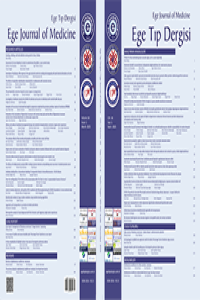Abstract
Ülkemizde yaygın olarak "Şekerci Boyası" olarak bilinen Phytolacca americana zehirli bir bitkidir. 43 yaşında erkek hasta bu bitkiden yapılan çayı tükettikten sonra karın ağrısı, bulantı, kusma ve göğüs ağrısı şikayetiyle acil servise başvurdu. Muayene ve testler yüksek laktat, C reaktif protein ve beyaz kan hücrelerini ortaya çıkardı. Destek tedavisi uygulandı ve semptomlarda iyileşme sağlandı. Literatürde bu bitkinin tüm kısımlarının insanlar ve memeliler için toksik olduğu belirtiliyor ve bu da erken teşhis ve destekleyici bakımın önemini vurguluyor. FDA bu bitkinin kullanımına karşı tavsiyede bulunuyor.
Ethical Statement
Olgu sunumu olduğundan etik kurul onayına gerek yoktur. Hastadan bilgilendirilmiş onam alındı. Yazarlar çıkar çatışması olmadığını beyan ederler. Yazarlar herhangi bir mali destek bildirmediklerini belirtirler
References
- Özbucak T, Sağlam A. Phytolacca americana L. bitkisinin farklı habitatlardaki azot ve fosfor makro element değerlerinin karşılaştırılması. Ordu Univ Bilim Teknol Derg. 2021;11(2):113-123.
- Fahmy NM, El-Shazly M, Farag MA, Ahmed AMA, Kamel MS. Chemical exploration of different extracts from Phytolacca americana leaves and their potential utilization for global health problems: in silico and network pharmacology validation. J Biomol Struct Dyn. 2024:1-21.
- Valle E, Vergnano D, Nebbia C. Suspected pokeweed (Phytolacca americana L.) poisoning as the cause of progressive cachexia in a Shetland pony. J Equine Vet Sci. 2016;42:82-87.
- Woolum JA, Spiller HA, Casavant MJ, Chounthirath T, Smith GA. Human exposures to Phytolacca americana in Kentucky. Toxicon. 2022;220:106962.
- Jaeckle KA, Freemon FR. Pokeweed poisoning. South Med J. 1981;74(5):639-40.
- U.S. Food and Drug Administration (FDA). Warning letter [Internet]. 2017 [cited 2024]. Available from: https://www.fda.gov/inspections-compliance-enforcement-and-criminal-investigations/warning-letters/duncans-botanical-products-inc-519077-05082017
Abstract
Phytolacca americana, commonly known as "Phytolacca" in our country, is a toxic plant. A 43 year old male patient presented to the emergency department with abdominal pain, nausea, vomiting, and chest pain after consuming tea made from this plant. Examination and tests revealed elevated lactate, C reactive protein, and white blood cells. Supportive treatment was administered, leading to symptom improvement. The literature indicates that all parts of this plant are toxic to humans and mammals, highlighting the importance of early recognition and supportive care. The FDA advises against the use of this plant.
Keywords
Ethical Statement
Ethics Committee approval is not required as it is a case report. Informed consent has been received from the patient. Authors declared no conflict of interest. Authors declared no financial support
References
- Özbucak T, Sağlam A. Phytolacca americana L. bitkisinin farklı habitatlardaki azot ve fosfor makro element değerlerinin karşılaştırılması. Ordu Univ Bilim Teknol Derg. 2021;11(2):113-123.
- Fahmy NM, El-Shazly M, Farag MA, Ahmed AMA, Kamel MS. Chemical exploration of different extracts from Phytolacca americana leaves and their potential utilization for global health problems: in silico and network pharmacology validation. J Biomol Struct Dyn. 2024:1-21.
- Valle E, Vergnano D, Nebbia C. Suspected pokeweed (Phytolacca americana L.) poisoning as the cause of progressive cachexia in a Shetland pony. J Equine Vet Sci. 2016;42:82-87.
- Woolum JA, Spiller HA, Casavant MJ, Chounthirath T, Smith GA. Human exposures to Phytolacca americana in Kentucky. Toxicon. 2022;220:106962.
- Jaeckle KA, Freemon FR. Pokeweed poisoning. South Med J. 1981;74(5):639-40.
- U.S. Food and Drug Administration (FDA). Warning letter [Internet]. 2017 [cited 2024]. Available from: https://www.fda.gov/inspections-compliance-enforcement-and-criminal-investigations/warning-letters/duncans-botanical-products-inc-519077-05082017
Details
| Primary Language | English |
|---|---|
| Subjects | Emergency Medicine |
| Journal Section | Case Report |
| Authors | |
| Publication Date | March 12, 2025 |
| Submission Date | June 10, 2024 |
| Acceptance Date | September 30, 2024 |
| Published in Issue | Year 2025 Volume: 64 Issue: 1 |
Ege Journal of Medicine enables the sharing of articles according to the Attribution-Non-Commercial-Share Alike 4.0 International (CC BY-NC-SA 4.0) license.

